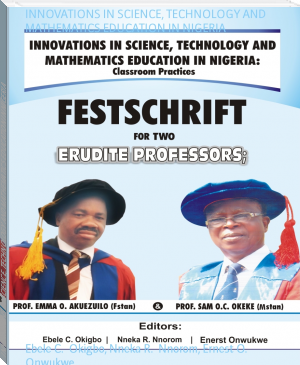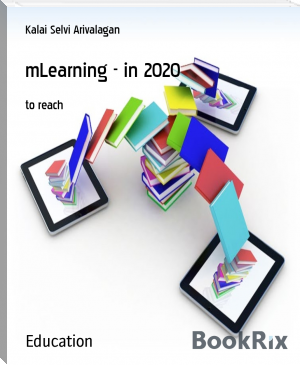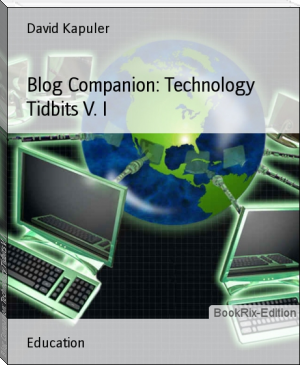INNOVATIONS IN SCIENCE, TECHNOLOGY AND MATHEMATICS EDUCATION IN NIGERIA - Ebele C. Okigbo, Nneka R. Nnorom, Ernest O. Onwukwe (best novel books to read TXT) 📗

- Author: Ebele C. Okigbo, Nneka R. Nnorom, Ernest O. Onwukwe
Book online «INNOVATIONS IN SCIENCE, TECHNOLOGY AND MATHEMATICS EDUCATION IN NIGERIA - Ebele C. Okigbo, Nneka R. Nnorom, Ernest O. Onwukwe (best novel books to read TXT) 📗». Author Ebele C. Okigbo, Nneka R. Nnorom, Ernest O. Onwukwe
The Federal Government of Nigeria therefore, introduced the Universal Basic Education (UBE) as a reform programme to serve as a catalyst for achieving free, compulsory and universal 9-year education for every child of school age in Nigeria (Danmole, 2011). According to Yusuf and Ajere (2009) UBE programme is to provide functional and effective education for Nigerian citizenry, and as a way of eradicating illiteracy, ignorance and poverty among them. In order to meet with the demands of the UBE programme, Obioma (2007) noted that the review, re-structure and realignment of the existing curricula for primary and junior secondary schools to fit into the 9-year Basic Education programme became imperative. This affected the subjects offered at these levels of education. The Primary Science for 6 year Primary School Education was restructured into Basic Science and Technology (BST) for lower basic level (primary 1-3) and middle basic level (primary 4-6), and Integrated Science to Basic Science (BS) for upper basic level (JSS 1-3) (Adeniyi, 2007 and Danmole, 2011). Consequently curricula for these subjects were also developed.
The overall objectives of the new BST curriculum as outlined by Adeniyi (2007) are to enable the learners to: develop interest in science and technology; acquire basic knowledge and skills in science and technology; apply their scientific and technological knowledge and skills to meet societal needs; take advantage of the numerous career opportunities offered by science and technology; and become prepared for further studies in science and technology. Furthermore, in order to achieve a holistic presentation of science and technology contents of learning, the thematic approach to contents organisation was adopted.
According to Obioma (2007), the 9-year Basic Education curriculum for BST reflects depth, appropriateness and inter-relatedness of the curricula contents. Obioma suggested that since the curriculum represents the total experiences to which all learners must be exposed, the contents, performance objectives, activities for both teachers and learners and evaluation guides were provided. The prescriptions represent the minimum content to be taught in the schools to achieve the objectives of 9-year Basic Education. However, teachers are encouraged to enrich the contents with relevant materials and information from their immediate environment, by adapting the curriculum to their needs and aspiration as well as those of their learners. This makes the outdoor education one of the veritable avenues for enriching and implementing effectively the content of the 9-year BST curriculum.
Outdoor Education
The term, outdoor education is used broadly to refer to a range of organized activities that take place in variety of ways in predominantly outdoor environment. The term emerged in the early 1940s to describe the instructional use of natural and built areas to meet student learning objectives in a variety of subject-matter disciplines through direct experiences. Conway (2010) also defined Outdoor Education as a method of teaching and learning process in the ‘outdoors’ for exploration and discovery about the environment using first-hand experience involving all courses of study. Outdoor education are those instructions and learning either formal or informal that takes place outside the school classroom or laboratory with natural or built materials or places to attain the objectives of teaching and learning through direct experience (Ukah, 2014). These definitions indicate that outdoor education is activity based or oriented.
The activity nature of outdoor education makes the learners to be active participants of the learning process using materials in the immediate environment. Dewey in Brügge & Szczepanski (2011) said that the formation of abstract concepts is made easier with practical handling of concrete materials and through concrete experience of the environment. This saying is not far from the use of outdoor educational activities in teaching. Thus, the teaching of science concepts using outdoor educational activities will enhance the learners’ easy understanding of the concepts especially, those within the learners’ outdoor environment. Dietz (2002) found out that pupils at the primary school age taught the concept of bark on tree using outdoor education did better than those taught the concept by bringing the bark of a tree to the class. Dietz (2002) concluded that bringing the bark of a tree to the class may make the concept to be abstract. This is because the pupils need to go outside the classroom and see how the bark of a tree is only one component of the whole tree. This view is supported by Piaget’s concept of cognitive development. According to Dietz, children at the sensori-motor (0-2 years), pre-operational (2-7 years), concrete operational (7-11 years) stages which are the lower and the middle basic years cannot think or reason in abstract terms (Ogwudire-Chukwudire, 2004). So, when science lessons are not presented in their actual settings, these children may have incomplete or disturbed ideas of the concept. This makes outdoor educational activities more appropriate in teaching these children those concepts in science the way they are in real live situations without being distorted in the indoor classroom.
In line with this, the researchers observed that some of these outdoor educational activities are also included in the Teacher’s activities of the 9-year Basic Education Curricula of BST for Primary 1-3 and 4-6 for lower and middle basic levels respectively (NERDC, 2007). The BST teachers are expected to implement among other things these outdoor activities in the course of their teaching of this subject at these basic levels. This is because no matter how laudable a curriculum plan is, its success depends primarily on the characteristics of teachers as they determine what happens during teaching and learning (Igbokwe, 2009). This view was supported by Kolawole (2011) that the proper implementation of any curriculum depends on the quality of the teachers. Despite this fact, Ukah (2014) discovered that BST teachers less often utilise these outdoor science educational activities in teaching BST. This corresponds with Ali (1998) that science lessons and activities are taught in planned ways, mostly in the school and rarely elsewhere in Africa. This paper therefore discussed the challenges to effective utilisation of outdoor education in teaching BST and offered some required therapy to ensure its optimal use in instructional delivery.
Challenges to Effective Utilisation of Outdoor Education in Teaching Basic Science and Technology
There are a number of challenges confronting teachers’ utilisation outdoor education in teaching basic science and technology. They include:
Teacher Training and Inadequate Provision for In-Service Programme:Teachers are very important factor in the teaching and learning process, and also are the hub of the implementation of any educational programme (NPE, 2004). Ihebere (2010) defined the teacher as the person that translates education objectives to the pupils through teaching and learning process. The teacher is also expected to interpret the content and learning experience as stated in the curriculum. For one to become a professional teacher, such person must pass through teacher education where they ought to acquire both the subject content and pedagogical skill. According to Osuji (2009), professionally qualified teachers are expected to have attained desirable attitudes, skills and knowledge to make them efficient and effective in their work. Ukah (2014) found that teachers claim of been exposed only to indoor teaching strategies during their teacher education. They also admitted of poor supervision during their teaching practices which made some them not to complete the required weeks of teaching practice especially teachers with university degrees. Adeosun, Oni, Oladipo, Onuoha and Yakassai (2009) found that students in Primary Education studies in colleges of education in Nigeria claimed that they were not adequately prepared during teaching practice in the areas of lesson preparation, use of instructional materials, and selection of instructional strategies, classroom etc. This indicates that the products of Nigerian colleges of education are inadequately prepared. Odili, Ebisine and Ajuar (2010) found that in few schools that have the basic science and technology curriculum, their teachers do not use the curriculum to guide their lesson preparation. Such actions can deter the adequate implementation of the curriculum and consequently, hamper the utilisation of the outdoor educational activities content of the curriculum.
As the saying goes, “Learning is believed to be a continuous process”. The teachers who are regarded as a pivot for imparting knowledge in the bastion of learning in our educational system are often deprived of the opportunities to update their intellectual acumen in the teaching and learning process (Ihebereme, 2009). Teachers that are concerned with updating their knowledge, sponsor themselves for in-service training, workshops, seminars and conferences. According to Ihebereme, the few sponsored workshop organised by the State Universal Basic Education Board (SUBEB) for teachers are made accessible to selected teachers on unverifiable basis. When the right and desiring teachers are deprived of the opportunity of the in-service programmes, their knowledge will be stunted as new changes, innovation and reforms are taking its toll in the field of education. The use of outdoor educational activity in teaching BST tends to suffer when the wrong or un-desirous teachers are selected for a BST workshop, where its awareness is created
Too Much Workload and Overcrowded Classroom: The Universal Basic Education (UBE) programme was introduced in Nigeria to provide free and compulsory education for every Nigerian child of school age has increased the number of pupils now in schools. Ihebereme (2009) noted that since its inception, teachers now have numerous subjects to teach in the primary school curriculum. In spite of the curricular activities, teachers are expected to participate in extra-curricular activities. According to Aduwa and Iyamu in Ihebereme, when teachers’ attention is deeply diversified, automatically an irreparable damage is done to the credibility of achieving effective teaching in the contemporary field of learning. Teachers therefore, tend avoid some activities which may include the outdoor educational activities in order to cover the less demanding indoors curriculum contents. This is because the outdoor science educational activities in the BST curriculum are generally demanding.
Inadequacy in Curriculum Availability: The BST curriculum has teachers’ activity column, where teachers’ activities in teaching each topic are described. This helps the teachers in effective instructional delivery. Adherence of teachers to this section of the curriculum will make the teachers to effectively utilise among other things the outdoor educational activities embedded in them. Odili, Ebisine and Ajuar (2010) and Ukah (2014) found that majority of primary schools do not have the BST curriculum for their teachers. This inadequacy is a big impediment to the teachers’ knowledge and use of the curriculum including the outdoor educational activities in teaching.
Stressful Planning and Organization: Outdoor educational activities like field trips, tours and excursion requires proper planning, group control and management. They are not actions or visits that are conceived and implemented overnight. They involved long-term planning with the head teacher, other teachers, parents and management in-charge of the places or sites to be visited. Ali (1998) noted that request for permission from the school head to visit a place should go out long in advance, indicating when the group plans to go, how many pupils and teachers will be going, arrangements for feeding and accommodation (if need be) any other relevant information needed for successful trip or outing. Ali went on to point out that the pupils should be informed about the nature and scope of the trip; where they are and for how long, provision of materials and equipment required for the trip and personal items to bring along and what they are expected to do when they get to the field site.
These require a lot from the teacher in terms of time, negotiating skills, subject content mastery and other professional competencies. These make some teachers to shy away from such ventures. The situation is exasperated when the teacher has done everything that is required and the expected permission from either the school head or the organization to visit did not come or come late. Such a teacher may find it difficult to engage in such outdoor activity in future.
Risk Management: Some of the outdoor activities involve some risks. In the case of field trip or tour, there is the risk of road accident, industrial accident and even lost of child. In the case of games and play, some children may injure others with hard object in





Comments (0)